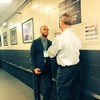Photo by Brian Spurlock-USA Today Sports
According to The Vertical's Adrian Wojnarowski, NBA legend and Hall of Famer Larry Bird has stepped down as president of the Indiana Pacers. Current general manager Kevin Pritchard, who once drafted Greg Oden ahead of Kevin Durant when he was with the Portland Trail Blazers, will replace him.As is the case whenever an NBA organization's primary personnel decider cedes his chair, this move will reverberate through the entire league. The Pacers were just swept by the defending champion Cleveland Cavaliers after finishing as a seven-seed for the second year in a row. Franchise player Paul George can become an unrestricted free agent next summer, and even though 12 months is an eternity in professional sports, it seems likely he'll sniff around for a new opportunity if the Pacers don't trade him first.And this isn't all Bird's fault, but instead of calmly explaining to George why a move to power forward would be best for everyone involved, he rammed the idea down his throat in public. It was an unnecessary confrontation and serves to this day as the fundamental reason Indiana can't evolve the way Bird wants.Not everything was an unsightly horror show, though. Bird bestowed his home state with Myles Turner, a 21-year-old who's already a vicious rim protector and can—but doesn't yet—shoot threes. He may be a top three center next season, and is the most persuasive reason to be optimistic for the team's future.Looking ahead to this summer, Pritchard will field offers for George. He'll also need to figure out what to do with C.J. Miles and Teague, who are both unrestricted free agents.The Boston Celtics, the Los Angeles Lakers, the Miami Heat, and any other team interested in adding a top-15 player will pick up the phone, but moving on isn't that simple. George's looming free agency should dampen the offers those teams are willing to make, knowing they can just sign him as a free agent the following July without forfeiting valuable assets.Bird didn't make this easy, but acquiring at least one lottery pick for George would be a massive haul. It would allow the Pacers to rebuild around Turner sooner than later—something Bird never seemed all that interested in doing.Indiana's future was complicated before Bird stepped down, but Pritchard—who once coined the phrase "treadmill of mediocrity" as a way to describe franchises that aren't quite good enough to contend and yet aren't bad enough to look forward to turning things around with a lottery pick—is taking over at a crucial time. What he does over these next six months could dictate the organization's next ten years.Want to read more stories like this from VICE Sports? Subscribe to our daily newsletter.
Advertisement
Before we get into what Bird's departure means for Indiana, though, let's first evaluate the mess he made and how we got here.We'll work backwards—recency bias is not Bird's friend. Last summer, the 60-year-old ran head coach Frank Vogel out of town, swapped George Hill for Jeff Teague, replaced Ian Mahinmi with Al Jefferson and Kevin Seraphin, and then traded a first-round pick for Thaddeus Young. Instead of picking up the uber-cheap team option on Solomon Hill's rookie-scale contract, Bird let him walk into New Orleans' open arms on a four-year, $48 million contract.Were these moves "bad"? It's debatable, but going strictly off Bird's own statements coming out of the off-season, the Pacers were supposed to play at a faster pace, score more points, and generally catch up to the rest of the NBA. That's a fine philosophy, but their execution was all wrong.Indiana's offense averaged 3.8 more points per 100 possessions this year, but its pace slowed down, and the defense crumbled. In 2015-16, 27.0 percent of the team's field-goal attempts were behind the three-point line; this year that number skyrocketed up to, um, 27.2 percent. Their fast-break points actually dropped.Committing three years and $30 million to Jefferson when no other general manager would pay him a Chipotle gift card was a mistake. Teague is younger and faster than Hill, but trading for that type of player just one year after Bird gave a fading Monta Ellis $44 million over four years only compounded an earlier mistake. There's too much awkward, and no obvious path toward even an incremental climb up the East through George's prime.Read More: Kawhi Leonard Is the Playoffs MVP, and That's a Problem for San Antonio
Advertisement
